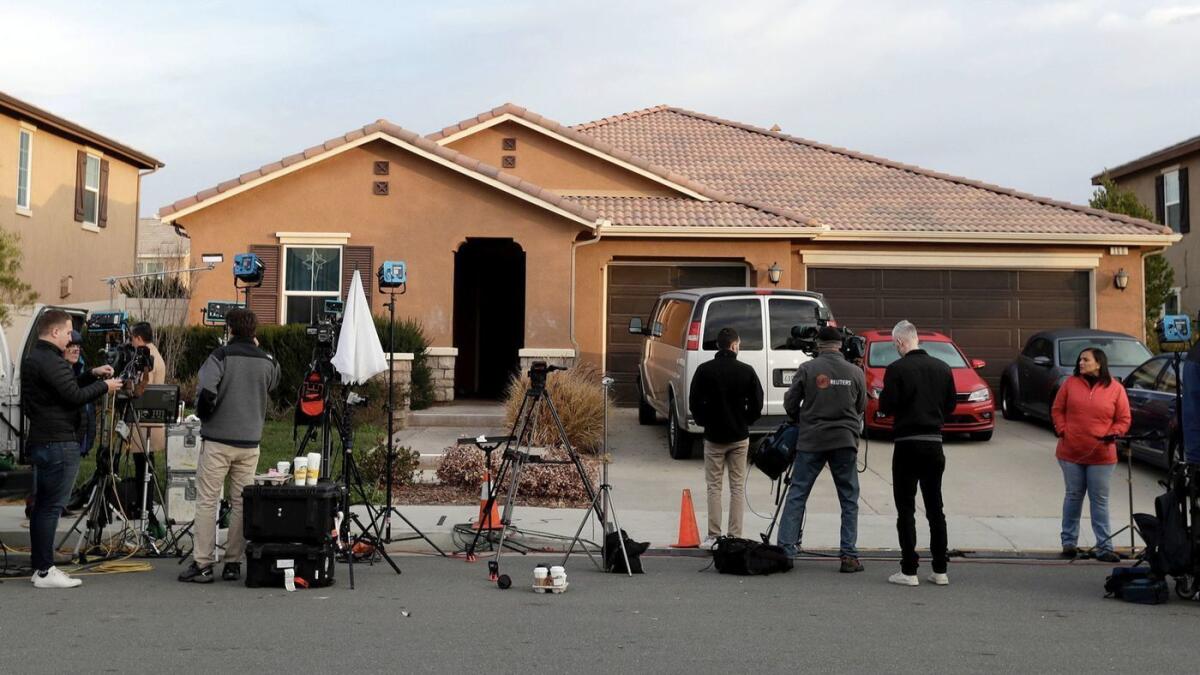Turpin abuse case prompts state bill to tighten regulation of home schools

- Share via
California lawmakers are pushing to increase regulation of home schools after a dozen siblings were discovered locked in a dirty, dark house in Riverside County.
The house in Perris had been registered as a private school — with the cheery name of Sandcastle Day School.
Last month, after a malnourished 17-year-old escaped and alerted authorities to the abuse she and her 12 siblings, ages 2 to 29, had endured there, her parents were arrested and charged with multiple counts of torture and child endangerment. David Turpin, 56, and Louise Turpin, 49, have pleaded not guilty to the charges against them and a judge has barred them from contacting their children.
David Turpin had registered with the state as the principal of Sandcastle Day, saying six school-age children were enrolled.
The case attracted national attention, including calls for California to reexamine its home-schooling policies.
On Friday, Assemblyman Jose Medina (D-Riverside) proposed a bill that he said would “tighten up” state regulation. Assemblywomen Susan Talamantes Eggman (D-Stockton) and Lorena Gonzalez Fletcher (D-San Diego) have signed on as co-sponors.
Under current state law, families who choose to educate their children at home are deemed to be operating private schools. They’re required to register with the state Department of Education and submit annual paperwork, known as a private school affidavit, that tells the state how many students are enrolled and where the school is located. The only way to guess which private schools actually are home schools is to look for those with very small numbers of students.
No one in the state Department of Education, county or local school district has any legal responsibility to check on the conditions of these home schools or assess the students’ academic performance. And while private schools are required to get annual fire inspections, this regulation has never been broadly applied to home schools.
Medina’s bill aims to change that. The proposed legislation would require city and county fire departments to conduct annual inspections of all registered home schools in their areas. Home-schooling families who live in parts of the state without fire districts would be subject to annual inspections by the Office of the State Fire Marshal.
Under the newly proposed language, the state superintendent of instruction would give these agencies lists of registered private schools within their jurisdiction, including those that report enrolling five or fewer students, which are likely to be home schools.
“The horrific child abuse case in Perris, California raised questions about the lack of oversight of private schools,” Medina said in a statement. “I believe it is important to have different education options, such as private schools, to meet each child’s individual needs. However, the state has a responsibility to ensure that each child is in a safe learning environment.”
California’s current law might seem unusually hands-off for a state often mocked for excessive regulation. But according to the Coalition for Responsible Home Education, a nonprofit that advocates for more active oversight of home-schooled children, the state has policies more more stringent than many others.
Eleven states don’t require parents to submit any documentation or register with state agencies or school districts. Among them is Texas, where the Turpin family lived for a time.
California is one of 15 states that ask only that families formally register with a state agency. Here, home-schooled children aren’t held to specific academic standards or required to take standardized tests. Their parents aren’t finger-printed and the state doesn’t check their criminal histories, as it would for a traditional public or private school teacher. Medina’s bill does not address those exemptions.
Mike Smith, president of the Home School Legal Defense Assn., a national advocacy group that opposes increased home-schooling regulations, called Medina’s proposal “the biggest threat,” to come out of California in recent years. He said the proposed language would violate home-schooling families’ Fourth Amendment privacy protections and single them out for unnecessary scrutiny.
“We know what they’re trying to do. They’re trying to get into home-school homes,” Smith said. “And they are very few ways you can invade a home. So that’s what this is intended to do.”
Even among groups that advocate for more monitoring, the reaction was lukewarm.
Rachel Coleman, executive director of the Coalition for Responsible Home Education, said the proposed bill doesn’t solve some major problems. The state is wrong to carve out exemptions for home-schooling families within its private-school law, she said, such as allowing home-schooling parents to avoid criminal background checks.
“The private school law in California was not designed for home-schoolers,” she said. “In many ways, an individual home-school statute would simplify the current legal situation.”
Twitter: @annamphillips
More to Read
Sign up for Essential California
The most important California stories and recommendations in your inbox every morning.
You may occasionally receive promotional content from the Los Angeles Times.











